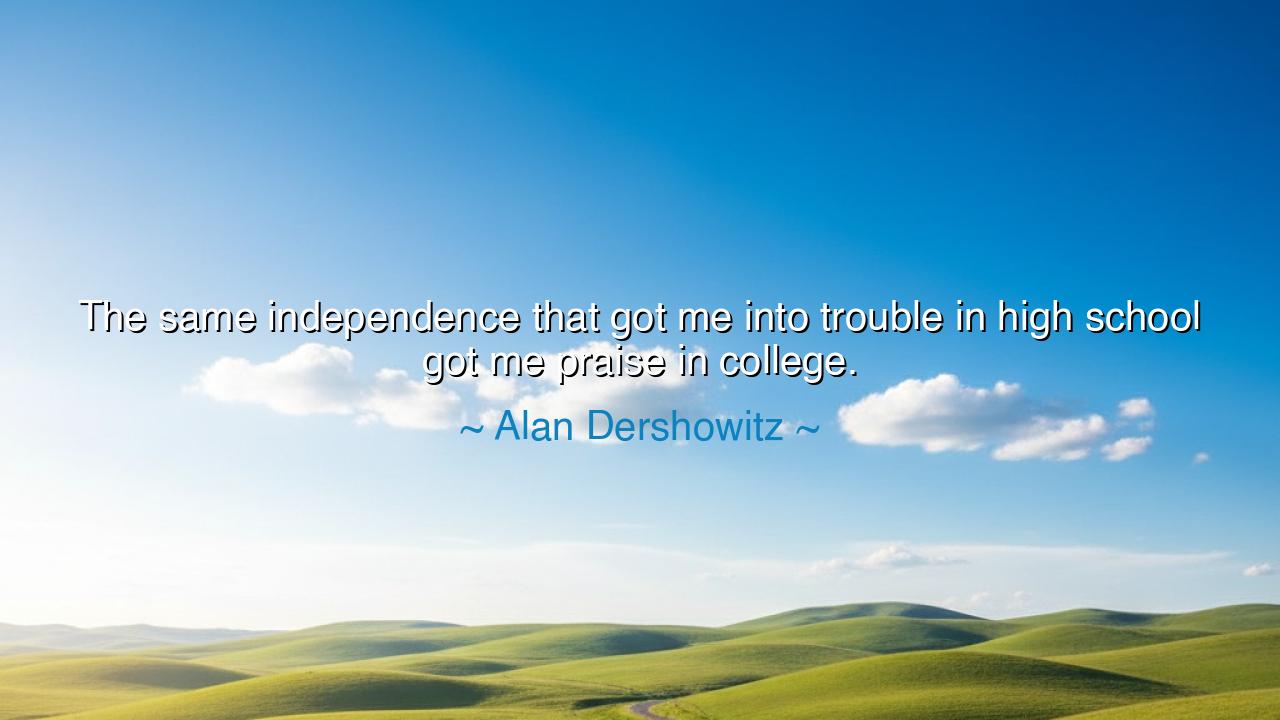
The same independence that got me into trouble in high school got
The same independence that got me into trouble in high school got me praise in college.






“The same independence that got me into trouble in high school got me praise in college.” Thus spoke Alan Dershowitz, the lawyer and scholar renowned for his fearless intellect and unyielding defense of reason, even when it defies the crowd. In these words, Dershowitz offers more than a reflection on youth — he reveals a profound truth about the nature of independence and the world’s changing gaze upon it. For what is scorned as rebellion in one season of life may be celebrated as originality in another; what once seemed defiance is later called wisdom. His words remind us that the quality of independent thought is timeless — it is not the world’s approval that defines it, but the integrity of the mind that dares to think freely.
In youth, independence often wears the mask of defiance. The young question what they are told, not out of arrogance, but out of the natural yearning of the soul to understand. Yet schools, families, and societies often mistake curiosity for disobedience. The student who challenges authority, who demands to know why, is often punished for insolence rather than praised for inquiry. So it was for Dershowitz — that same restless intellect that unsettled his teachers in high school would later bring him honor in the world of law and academia. For the same spirit that disrupts the complacent order of the classroom is the one that reshapes the world beyond it.
This is the paradox of independence: society both fears it and depends on it. The ancients knew this well. Socrates, the great philosopher of Athens, was condemned for corrupting the youth — his crime, simply, was to teach them to think. He was accused of impiety, but his true offense was independent reasoning. Yet centuries later, the same Athens that silenced him became the cradle of philosophy, built upon the very principles he died for. In the life of Socrates, as in the youth of Dershowitz, we see how independence first appears as rebellion before it is understood as revelation. The world is slow to recognize the value of a free mind — but in time, it always must.
In college, the soil changes, and the same seed that once struggled to grow finds nourishment. The university, at its best, is the temple of inquiry, where questions are not only allowed but demanded. Here, independence is no longer punished — it is praised. The young mind, once told to obey, is now asked to analyze, to debate, to challenge. The independence that was once seen as disruptive becomes the very hallmark of genius. What Dershowitz found was not that he had changed, but that the world around him had — that maturity and environment determine whether a society rewards conformity or courage.
Yet the truth goes deeper still. The lesson of this quote is not merely about education — it is about life itself. At every stage, the value of independence depends upon the eyes that behold it. In times of comfort, the independent spirit is often unwanted, for it disturbs the easy peace of ignorance. But in times of need — in moments of crisis or stagnation — it is that same spirit that saves the world. History’s great figures — Galileo, Rosa Parks, Nelson Mandela — all faced condemnation before they earned praise. They were seen as troublemakers until time revealed them as torchbearers. Thus, the independent soul must endure misunderstanding, for it always walks ahead of the crowd.
Dershowitz’s reflection reminds us, then, that we must never abandon our integrity merely to escape discomfort. For the approval of others is fleeting, but truth, once found, endures. The independent mind must learn patience — to suffer the scorn of today in the faith that tomorrow will understand. The child who questions becomes the thinker who leads; the troublemaker becomes the reformer. In this way, independence is not rebellion for its own sake — it is the deep, unwavering call to live by reason, not habit; by conscience, not convenience.
So let this teaching be passed to those who follow: guard your independence as your most sacred gift. Let it guide you even when it leads to isolation, for the lonely path of truth is the road that builds civilizations. Do not fear the reproach of the present; instead, honor the quiet knowledge that time vindicates the thinker. Be humble enough to listen, but brave enough to disagree. The world may not always reward your independence — but without it, you will never become fully alive.
And when your own day of praise arrives — when those who once doubted you now call you wise — remember what Dershowitz’s words truly mean: that the power of independence lies not in recognition, but in constancy. To think freely, to speak truth, and to stand firm — these are the marks of the soul that grows, not by approval, but by authenticity.






AAdministratorAdministrator
Welcome, honored guests. Please leave a comment, we will respond soon